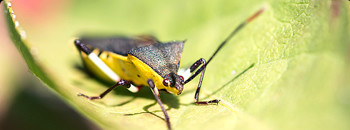This weekend, enjoy your Father’s Day celebration outdoors. One of the best ways to spend time with family and friends is to take part in outdoor activities like barbecuing, ball games, or simply kicking back in the shade. Almost synonymous to outdoor fun are outdoor pests like mosquitoes, ticks, wasps and pesky flies. With Father’s Day also falling on Men’s Health Week, following are helpful tips to keep dad and your loved ones safe from unintended harm:
Avoid dawn and dusk. Unfortunately, an early morning breakfast or evening meal outside can leave you unarmed against mosquitoes and ticks. Dawn and dusk are popular times for

pests to join you outdoors. Ticks, mosquitoes, and poison ivy can cause Lyme disease, West Nile virus, and severe allergic reactions, respectively. To avoid pests, consider a proactive spray around the perimeter of your yard, apply insect repellant or wear light, long sleeve shirts and pants.
Reduce standing water. Stagnant water attracts mosquitoes. A good way to eliminate standing water is to clean the landscaped areas in your outdoor spaces each week. For example, change water in birdbaths and wading pools at least once a week and do not allow water to accumulate for more than two days at the base of flowerpots or in pet dishes.
Maintain your gas grill. The fire safety industry suggests checking the tubes leading to the burners on a gas grill to ensure they are clear and not blocked by insects or rodents.
Clean as you go. With whatever outdoor activity you choose to do this Father’s Day, especially those involving food, make sure to clean up promptly to avoid attracting pests inside the home. Do not leave food out too long or store it in sealable containers whenever possible.
Resources: Mosquito Safari, an interactive backyard hunt for mosquitos courtesy of Texas A&M Agrilife Extension
Learn more: Visit DebugTheMyths.com and U.S. Centers for Disease Control and Prevention. You can also follow Debug the Myths on Facebook and Twitter.
Sources: Moxie Pest Control of Arizona, NBC4i, U.S. Centers for Disease Control and Prevention.

